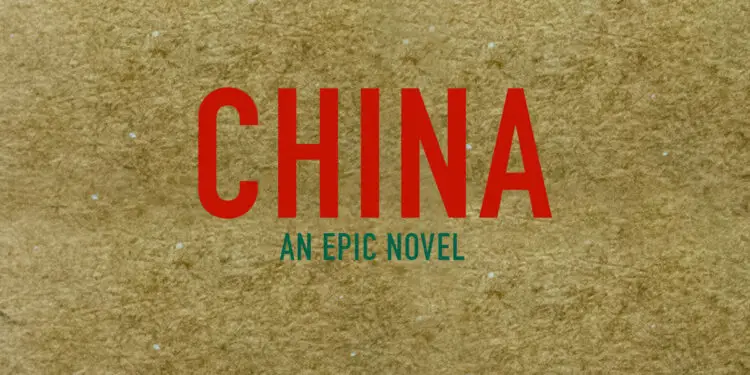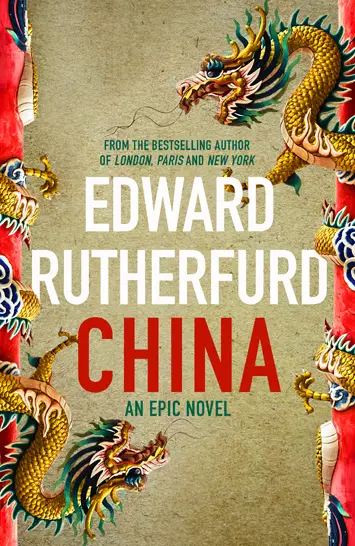China by Edward Rutherfurd – Review

By Sandra Callard
The book is huge, heavy and unwieldy. It has no illustrations and the print is relatively small. It has 763 pages of packed text and is called, simply, China. Written by Edward Rutherfurd, the author of a number of geographically named novels such as Russka, Paris, New York and London, it seemed a daunting project to tackle as a review subject, and it took me until page 150 to realise I was reading a spectacularly glorious epic!
Reviewers like to quantify the strength, or lack of, an author’s research, and Rutherfurd’s is flawless and frighteningly revealing. The story follows an extensive number of characters’ lives throughout the nineteenth century in China, so he cannot have had a real life experience of the country then, but he seems to have done it somehow. China rises up like a lion in the mind’s eye. The emperors, the poor, the greedy and the religious stream before the reader in a fantastic panoply of the country and its customs, its politics and the everyday life of a people whose whole aim of living is to work, bribe or kill their way to a higher plateau of society.
 China was, and perhaps still is, a country of contrast with heart-rending beauty and a populace that, certainly in the nineteenth century, lived amongst, and accepted, the most appalling brutality, even to themselves. Where else in the world would a father show his seven year old son how to kill himself quickly if an unbeatable enemy approached him.
China was, and perhaps still is, a country of contrast with heart-rending beauty and a populace that, certainly in the nineteenth century, lived amongst, and accepted, the most appalling brutality, even to themselves. Where else in the world would a father show his seven year old son how to kill himself quickly if an unbeatable enemy approached him.
“Slowly captivated”
The book shows that China is ruled by invisible Emperors with the power of the gods. A worker can be beheaded for spilling a liquid on the clothing of the Emperor or his wife or concubine, and the population at large has no power whatsoever against this and the countless similar laws. It is into a land such as this that British traders and missionaries deigned to enter. The commodity the traders valued most was Chinese opium, which was used liberally by the natives and was also a drug to be coveted by the outside world. The British government freely agreed to traders dealing in the drug, which made both traders, dealers and governments huge fortunes. Because it was legal to trade in opium, it achieved a cloak of respectability and one of the major characters in the story, John Trader, married into a wealthy family and bought himself a Scottish castle and estate and lifelong respectability on the back of his earnings from opium.
Rutherfurd’s text flows easily between the different nationalities, all of which tend to stay within their own creeds, but it is the traits and beliefs of the Chinese that tend to hog the limelight. Their little known beliefs such as painful foot binding for children so they can, inexplicably, as women, be considered beautiful and elegant, thus making a good marriage, is revealed in all its vicious detail. It was new to me that foot binding was only used by a small number of Chinese so-called aristocrats, with the majority of the population thankfully ignoring it.
China is a challenging book, but the more you read the more intriguing it becomes, as the reader is slowly captivated by this strange and complicated nation. The characters, both Chinese and British, are solidly real people with the same human frailties that all people have. We can sympathise with some, dislike others and feel for the downtrodden, as nineteenth century China and Britain vie for superiority. As the twentieth century beckons, both nationalities begin to realise that to have a booming economy between the two nations requires peace and talking, rather than the continual spats of war that were the norm, and this barnstormer of a book can take its rightful place as a true historical epic.
‘China: An Epic Novel’ by Edward Rutherfurd is published by Hodder & Stoughton, out 13th May










I think your review of China by Edward Rutherfurd is very poorly constructed and contains a large number of factual errors not all of which you would have picked up from the book. The opium trade was based on Indian opium from Bengal which the British sold illegally into China. Opium was used as a health tonic in China and elsewhere where it was combined with other ingredients and swallowed. The British and Americans who had developed tobacco smoking developed the technique of smoking opium to ensure addiction and growing sales. This was done to reset the trade balance with Britain which imported tea, ceramics and silk and had to pay in silver. China did not want to buy what they regarded as inferior or culturally inappropriate goods from Britain. At that time Britain’s colonies did not include silver producing areas of the world like Mexico. Therefore a trade imbalance was created. Opium despite being declared illegal by the Chinese emperor once the addiction problem emerged continued to grow via traders who were licensed by the East India Trading company. Britain went to war with China because China destroyed inventory in an attempt to enforce its internal laws. China was weak militarily and ended up being defeated and had to hand over Hong Kong and the new territories. If you and other people in the UK had a greater knowledge of the opium war you might understand why the Chinese regard the British ownership of Hong Kong as a period of national shame. It is surprising that you can write a review which contains so many factual errors. The source of the opium it’s legal status are absolutely critical to understanding the Chinese view. Your comments about Chinese brutality are correct but are not radically different from what applied elsewhere even in the UK where the death penalty was liberally and unequally applied to lower class people. It’s unfortunate that your views on history are widely held in the UK and contribute to a lot of misunderstandings about China. The history of China since the 1840s is a tragic one based on numerous developments post the treaty of Versailles where despite being on the winning side it’s German concessions were handed over to the the Japanese a long standing enemy of China. It’s perhaps hardly surprising that China has evolved outside the liberal democracies in the west and therefore to evaluate China as an emerging liberal democracy is flawed. At the same time even a cursory reading of Chinese history would allow you to conclude that European style expansionism ie taking over other countries is not part of the thinking. Even during the great dynasties of the Han, Tang and Ming China secured its borders from foreign invasion. China has witnessed invasion on several occasions which resulted in dynasties ending. China is therefore very well aware of foreign threats. A growing military strength is for defence so that they never again have to suffer what the British did to China. Confucianism puts state before family and family before individual. This has been part of China for over 2000 years. It is therefore almost the exact opposite of a western style liberal democracy. My main point in all of this is to recognise that China is set to become the worlds largest economy. If Britain wants to establish a new global presence then a proper understanding of the world would be a reasonable starting point.